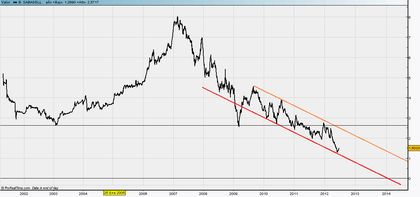(S)CAM Bank Preference Shares
 An 80 year-old rural-based lady who could not write nor read was told it was the ideal product for her, others were advised that it was a secure fixed-deposit they could cash at any time, when the small-print indicated that the deal’s maturity was postponed till… 31/12/3000 and many others were simply duped by excessively commission driven bank staff.
An 80 year-old rural-based lady who could not write nor read was told it was the ideal product for her, others were advised that it was a secure fixed-deposit they could cash at any time, when the small-print indicated that the deal’s maturity was postponed till… 31/12/3000 and many others were simply duped by excessively commission driven bank staff.
Examples of the inventiveness of despicable branch managers, hoping to convince anyone with any decent sum of money entrusted to them, are as abundant as are the numbers of people affected: around 900,000 according to some estimates.
It makes me wonder how come savers who bought Spanish banks’ preference shares, or were (mis)sold rather, have not revolted as pretty much everyone stuck with this “toxic refuse” would argue that bank managers doing time in some Siberian gulag would not be harsh enough.
Below is an email sent to a client advising on what I think are the different options specifically related to CAM and Sabadell:
Dear John
I have been getting information about this offer made by Banco Sabadell.
As you know, the original CAM was split into to 2, the CAM Savings Bank and the CAM Bank, that was taken over by Sabadell.
You purchased “participaciones preferentes”, which form part of the latter and therefore, are taken over by them. Had you had “cuotas participativas”, which are a type of share or bank stock, the value today would be literally zero.
Banco Sabadell is now offering that you change your preferential shares for ordinary Banco Sabadell shares, until the 27th of July 2012. One thing seems clear from all of this: it is difficult to predict whether it best to accept the swap or not.
The 3 options you would have now are as follows:
- Accept the swap: the main advantage with this is that you get rid of a perpetual product, which is exactly the nature of these shares (and which was never told to you when you “bought” them). The main disadvantage is that you can lose a substantial part of your investment if you sell, in fact you will, since you are being offered shares at €2.3 per share when the value is now around €1.5 per share.What you would then need to do is cross fingers and hope that the share value goes up to €2.3 so that it washes its face (at €2, you would be losing in the region of 20%). Below is a chart showing the trend of the bank, clearly downward.
- Keep the “preferential shares”,which would allow you to keep receiving the annual coupon, as it is called, provided the bank has profits. The bigger problem is that lack of liquidity: if you wish to sell them you need to go to the secondary market, a pretty difficult scenario nowadays.
- Sue CAM and Sabadell invoking that contracts were sold unlawfully i.e., without a clear, transparent and concrete explanation of the nature of the product and associated risks. This again throws you into the litigation route, which we had managed to avoid till today…but it may mean that your contract is declared null and void. Following a consultation with our legal library elderecho.com, there are currently 63 Court rulings showing when typing the search words “participaciones preferentes”, some as back as 2005 (which indicates that far from being a novelty, defrauded bank users have silently battled along…I cannot give just now the proportion of wins vs. loses but there are of both types).
It appears that many people are accepting the swap as the least worst of options, but many others are staying put since there may be a second “offer” for those investors who chose not to swap: the value here is unknown though.



 Banks must have done something really dodgy in respect of these Russian-roulette
Banks must have done something really dodgy in respect of these Russian-roulette